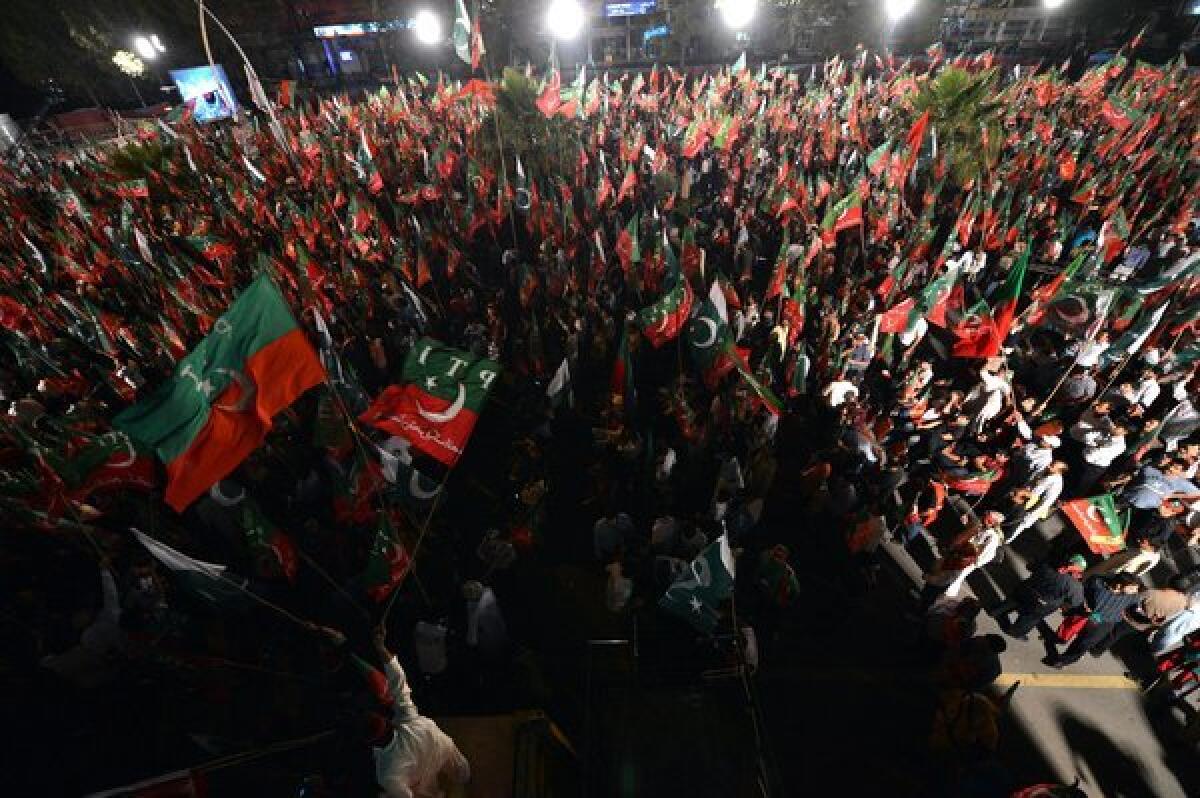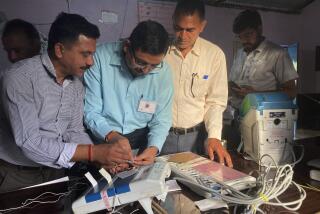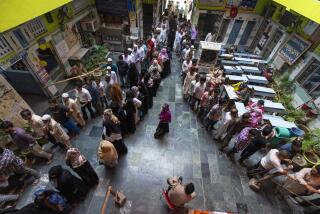Bombs, bullets and baby steps toward democracy in Pakistan

- Share via
Kidnappings, suicide bombings and hundreds of violent deaths have bloodied Pakistan’s campaign trail. Still, the parliamentary vote Saturday is being heralded as a milestone in the country’s democratic advancement.
Once the votes are tallied and a new government formed, it will be the first time in Pakistan’s 66-year history that one elected leadership succeeds another, and that the departing government was able to serve out its full term.
Politics remains a dangerous endeavor in Pakistan. On Thursday, a provincial assembly candidate was kidnapped at gunpoint and his bodyguards killed in the southern city of Multan, just days after bombs struck campaign events across the political spectrum. Most of the attacks have been claimed by the Taliban in its open war against secular leaders.
But some political analysts see the deadly intimidation as the religious extremists’ desperate last battle against pluralism as Pakistanis attempt to break a cycle of military dictatorships and corrupt civilian rule.
Two candidates with ambitious visions for the country have emerged as the leading contenders from a crowded pack vying for control of the 272-seat parliament. Although different in ideology and temperament, either would be expected to further strengthen the rule of law if they win outright, forge a governing coalition or broker an alliance of convenience with other lawmakers.
Nawaz Sharif, a former prime minister ousted by Gen. Pervez Musharraf in a 1999 military coup, and his Pakistan Muslim League are poised to gain the largest share of votes, according to pollsters, though probably not enough to form a government on their own. Short of a majority, Sharif could join forces with the incumbent but rudderless and unpopular Pakistan People’s Party (PPP), or any other mainstream faction that picks up a sufficient number of seats.
One potential spoiler for Sharif is retired cricket star Imran Khan, whose Movement for Justice, or PTI, has inspired young people to believe in the possibility of a Pakistan free of corruption, graft and ineffective leaders. Khan also is surging on the eve of the election from an unexpected -- and somewhat inexplicable -- bounce of sympathy and media attention after his fall Tuesday at a campaign event that left him with three fractured vertebrae and a broken rib.
“Imran Khan doesn’t need to invest any more money in his political campaign because the mainstream media are doing that for him,” said Asia Society senior advisor Hassan Abbas, only partly joking about the nonstop bedside coverage of the injured candidate.
Khan, 61, hasn’t held public office and has presented himself as the only candidate capable of inspiring reform and modernization. He has stirred politically apathetic youth in a country whose median age is 22 with his vows to boost education spending fivefold and reform the police force.
But Sharif and Khan have refrained from direct confrontation with the Taliban or criticism of its attacks on the institution of voting. That has raised questions about how much political capital either would be willing to expend to rout the religious zealots who still exercise strong influence in rural areas and the volatile Afghan borderlands.
Sharif has evaded much of the wrath of the Taliban by cutting preelection “seat adjustment” deals with rivals, including religious extremists. The collaboration involves dividing up election districts where two parties’ votes are likely to be split and lost to a strong third party. By agreeing not to compete against each other, each party gets a better shot at prevailing in more races.
Daniel Markey, senior fellow for South Asia at the Council on Foreign Relations, said Sharif’s dealing with the religious conservatives makes some voters uncomfortable because they are unsure whether the political nonaggression pacts are simply expedient or whether he is actually sympathetic to the militants.
“A lot of people say that if the PPP could make that deal, they’d make it. Or if the PTI could make that deal, they would. But Sharif is the one making the deal and you have to wonder, when someone makes a deal with the devil, what the devil is going to want in return,” Markey said.
Regardless of the dubious political horse-trading involved, this election is expected to be notably free and fair because of constitutional and legal changes that have put into place the most independent and impartial Election Commission the country has ever had, said Ishrat Saleem, a research associate with the Middle East Institute Center for Pakistan Studies.
Once a new government is sworn in, Washington may have to reassess its policy toward Pakistan, she said. That means U.S. officials may have to redirect their mutual work on counter-terrorism and other strategic objectives from military to civilian leaders.
Much is at stake for Pakistanis, their neighbors and their allies, but progress on democracy is unlikely to be derailed by the Taliban’s scattered disruptions, the analysts say.
“The Taliban have been attacking, but how the people are responding is significant. They are standing up and saying, no, we will stay in this and fight,” said Asia Society’s Abbas, predicting a near wipeout of elected religious radicals. “This is an election with so many contradictions, but the real hope is that public wisdom will push the country in the right direction, that people will see the Taliban is against the very notion of democracy and that they should vote for parties with the best bet to defeat extremism and ensure a prosperous and progressive Pakistan.”
ALSO:
American man stabbed outside U.S. Embassy in Cairo
Karzai: U.S. wants use of 9 bases in Afghanistan after 2014
Global Voices: Ahmadis’ mission of peace in an age of terror
A foreign correspondent for 25 years, Carol J. Williams traveled to and reported from more than 80 countries in Europe, Asia, the Middle East and Latin America.
More to Read
Sign up for Essential California
The most important California stories and recommendations in your inbox every morning.
You may occasionally receive promotional content from the Los Angeles Times.











